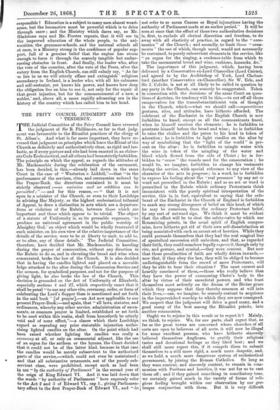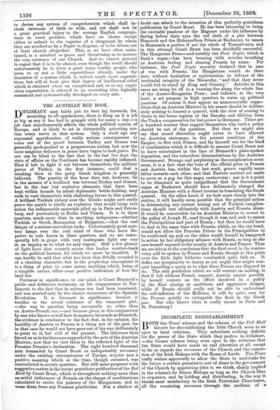THE PRIVY COUNCIL JUDGMENT AND ITS ' TENDENCY. T HE Judicial
Committee of the Privy Council have reversed the judgment of Sir R. Phillimore, so far as that judg- ment was favourable to the Ritualist practices of the clergy of St. Alban's. And what is far more important, they have re- versed that judgment on principles which leave the Ritual of the Church as definitely and authoritatively clear, as rigid and ine- lastic, as if every posture and rite had been enacted in an elabor- ate Code Ecclesiastical, and all others had been strictly forbidden. The principle on which the appeal, as regards the attitudes of Mr. Mackonochie during the celebration of the sacrament, has been decided, is this,—already laid down in the same Court in the case of " Westerton v. Liddell,"—that "in the performance of the services, rites, and ceremonies ordered by the Prayer-Book, the directions contained in it must be strictly observed ;—no omission and no addition can be permitted; "— and for this reason, — " that it is not open to a minister of the Church, or even to their Lordships in advising Her Majesty, as the highest ecclesiastical tribunal of Appeal, to draw a distinction in acts which are a departure from or violation of the Rubric, between those which are important and those which appear to be trivial. The object of a statute of Uniformity is, as its preamble expresses, to produce an universal agreement in the public worship of Almighty God,' an object which would be wholly frustrated if each minister, on his own view of the relative importance of the details of the service, were to be at liberty to omit, to add to, or to alter, any of these details." The Judicial Committee, therefore, have decided that Mr. Mackonochie, in kneeling during the prayer of consecration, without any direction in the Rubric to do so, and in elevating the bread and wine when consecrated, broke the law of the Church. It is also decided that in having the candles lighted and placed on a movable ledge attached to the altar during the Communion Service and the sermon, for symbolical purposes, and not for the purpose of giving light, he also broke the law of the Church. This decision is grounded on the Act of Uniformity of Elizabeth, especially sections 4 and 27, which respectively enact that it shall be penal " to use any other rite, ceremony, order, or form of celebrating the Lord's Supper than is mentioned and set forth in the said book " [of prayer],—an Act now applicable to our present Prayer-Book ;—and again, that " all laws, statutes, and ordinances, whereby any other service, administration of sacra- ments, or common prayer is limited, established or set forth to be used within this realm, shall from henceforth be utterly void and of none effect,"—a clause which their Lordships regard as repealing any prior statutable injunction autho- rising lighted candles on the altar. On the point which had been raised whether lighting the candles was really a ceremony at all, or only an ornamental adjunct, like the use of an organ for the anthem or the hymns, the Court decided that it could not be of the latter kind, because in that case the candles would be merely subservient to the authorized parts of the service,—which could not even be maintained ; • and that all substantive ornaments, not of the purely sub- servient class, were prohibited, except such as had been in use " by the authority of Parliament" in the second year of the reign of King Edward VI. And it was laid down that the words " by authority of Parliament " here expressly refer to the Act 2 and 3 of Edward VI., cap 1., giving Parliamen- tary effect to the first Prayer-Book of Edward VI., and " do not refer to or mean Canons or Royal injunctions having the authority of Parliament made at an earlier period." It will be seen at once that the effect of these two authoritative decisions is, first, to exclude all clerical discretion and freedom, -to do away with all elasticity of practice, in regard to the " cere- monies " of the Church ; and secondly, to limit those " orna- ments " the use of which, though novel, would not necessarily be restrained, to purely subservient elements in the service, like- " an organ for the singing, a credence-table from which to take the sacramental bread and wine, cushions, hassocks, Sm."
The importance of this judgment, which, having been delivered by a Conservative ex-Lord Chancellor (Lord Cairns), and agreed to by the Archbishop of York, Lord Chelms- ford (another Conservative ex-Chancellor), Sir W. Erle, and Sir J. Colvile, is not at all likely to be called in question by any party in the Church, can scarcely be exaggerated. Taken in connection with the decisions of the same Court on ques- tions of doctrine, its tendency will be this,—to cut off all those escape-valves for the transubstantiationist vein of thought in the Church, which—what we should call—superstitious gestures, rites, and attitudes, have hitherto afforded. The celebrant of the Eucharist in the English Church is now forbidden to kneel, except as all the communicants kneel, when he himself receives the elements ; he is forbidden to prostrate himself before the bread and wine ; he is forbidden to raise the chalice and the paten to his head in token of adoration ; he is forbidden to light candles on the altar by way of symbolizing that the "light of the world" is pre- sent on the altar ; he is forbidden to mingle water with the wine in token of the mingling of the water and blood which flowed from the side of Christ ; he is for- bidden to "cense " the vessels used for the consecration ; he would be, we imagine, forbidden to change his vestments during the service, with special reference to any view of the character of the acts in progress ; in a word, he is forbidden to express his feeling about the real presence ' by any act or word not prescribed in the Rubric ; and as no act or word is prescribed in the Rubric which ordinary Protestants think inconsistent with the purely spiritual interpretation of the service, this is, in fact, equivalent to saying that the cele- brant of the Eucharist in the Church of England is forbidden to mark any strong divergence of belief on this head, of which he may be conscious, from the ordinary Protestant belief, by any sort of outward sign. We think it must be evident that the effect will be to shut the safety-valve by which our Romanizing priests, in the usual spirit of English compro- mise, have hitherto got rid of their own self-dissatisfaction at being associated with such an arrant set of heretics. While they could persuade themselves that they had the real magical line of apostolical succession still unbroken, and that, as regarded their faith, they could somehow legally express it, though only by rite, and gesture, and symbol,—they were content. But now that these peculiarities of faith are wholly driven inwards,— now that, if they obey the law, they will be obliged to become undistinguishable from the crowd of mere Protestants, will they be able to bear their situation ? The most earnest and heartily convinced of them,—those who really believe that they have the power of summoning Christ's body to the altar by virtue of their sacerdotal powers, and who feast themselves most ardently on the dream of the Divine grace which they suppose that they thereby summon at will into their lives,—can, we imagine, be scarcely content to acquiesce in the impoverished worship to which they are now consigned. We suspect that the judgment will drive a good many, and a good many of the best among the Ritualist priests, into another communion.
Ought we to rejoice in this result or to regret it ? Mainly, we think, to rejoice. We, for our parts, shall regret that, so far as the great towns are concerned where churches of all sorts are open to believers of all sorts, it will now be illegal for some excellent persons, who have hitherto sincerely believed themselves Anglicans, to gratify their religious tastes and devotional feelings as they liked best ; and we shall still more regret this, if it compels them to submit themselves to a still more rigid, a much more despotic, and, as we hold. a much more dangerous system of ecclesiastical government, by joiniug the Roman Catholics. So long as they were content, and sincerely content, to remain in com- munion with Puritans and heretics, it was not for us to cast them off ; and if they gained something in conciliatory tone, we certainly gained much in the variety of forms of reli- gious feeling brought within our observation by our gro- tesque conjunction with them. But it is very difficult-



































 Previous page
Previous page